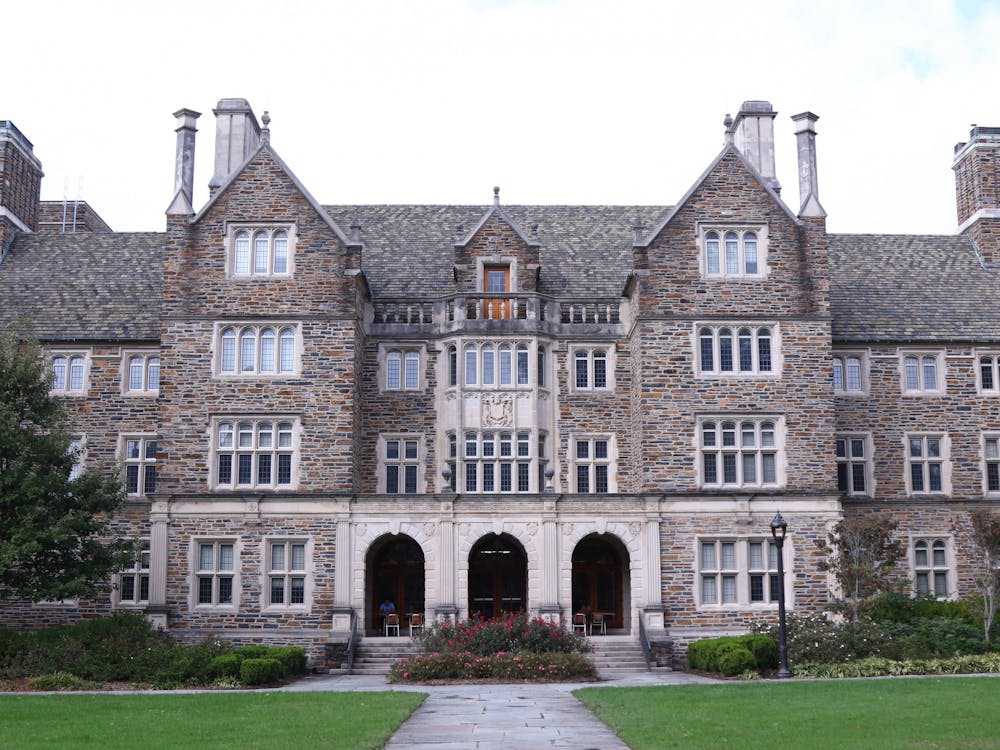As Duke has responded to a global pandemic, students have played their part.
Two prominent groups that worked with Duke’s senior administration to plan the semester were Duke Student Government and the 2021 Student Advisory Board. The board was founded over the summer to get student input for COVID-19 planning.
“Especially with the arrival of Gary Bennett and Mary Pat McMahon, the integration of student feedback within senior leadership, both in student affairs and undergraduate education, has been awesome,” said DSG President Tommy Hessel, a senior.
DSG’s executive board discussed how important it was that student input should be taken into account, especially given the fast-paced timeline of decision-making during a pandemic.
They emailed administrators including President Vincent Price; Provost Sally Kornbluth; Gary Bennett, vice provost for undergraduate education; and Mary Pat McMahon, vice provost and vice president for student affairs, at the beginning of the summer, “just emphasizing the fact that student input should still be taken into account, no matter what avenue that may be,” said Shrey Majmudar, DSG vice president for academic affairs.
“They then came back to DSG and were like, “Why don’t you all student leaders figure out and put forth 20 to 30 student leaders from across the student body,’” Majmudar said, and McMahon and Bennett picked the final slate of board members.
Over the summer, starting in early June, members of the board met weekly with at least two different campus stakeholders to provide feedback.
“We met with athletics over the summer, we met with all of the different Wellness Center directors, we met with all of the different identity and cultural center directors, Clay Adams and Jeanna McCullers on student conduct and fall policies, all sorts of different units like that to provide feedback,” Majmudar said.
During these meetings—called “deep dives”—the unit leaders walked the student advisory board through their plans for the fall and strategy for tackling the pandemic.
“A good example was dining. All the different things that you see on campus right now in terms of the mobile takeout or delivery spots in terms of the arrows in [the Brodhead Center] and which directions to walk, the socially distanced line placeholders,” Majmudar said. “They'd walked us through all of that over the summer well before we saw it as students on campus.”
After each of these weekly deep dives, SAB would gather for about two hours and put together a one- or two-page memo to provide feedback to the parties that they had met.
“Most of that advice was taken into account,” Majmudar said.
At the same time, DSG was engaged in its own work.
“We started working over the summer, which DSG never does,” Hessel said. “We were in full force, communicating about what plans were going in place about the schedule, registration deadlines, [satisfactory/unsatisfactory grading] policy—so all kinds of policy things and less of student initiatives.”
Sue Wasiolek, assistant vice president for student affairs, and senior advisor to McMahon, said that feedback not only came from undergraduates but also from graduate and professional students.
“The graduate/professional advisory group has been critical in providing input into various COVID-related policies and practices impacting graduate and professional students,” Wasiolek said. The group includes a representative from the graduate school and each of the professional schools, she said.
The Provost’s office is working with DSG on possible long-term COVID-19 compliance incentives, Hessel said.
“We would collaborate with class councils and DUU to have groups of students participate in COVID-19 compliance and then be eligible to win a cool, repeating incentive for their group––similar to tenting and not missing a check,” he said. “Incentives we are trying to pin down are tunneling, chapel climb, dinner at admin and faculty spaces, famous alumni meet-and-greets, etc.”
Administrators also collaborated with students on Winter Breakaway, a two-week learning experience from Jan. 4 to 15.
“They read us in to what was coming. We met and provided again a ton of student input on here's what the name should be. Or here's what marketing should look like. Or here's what some of the logistics should look like,” Majmudar said.
DSG and the student advisory group pride themselves on the diversity of students involved in decision making.
“Having been involved with SAB, I am confident that they sought to obtain a comprehensive representation of the student population,” said Vice Dean of Students Amy Powell, who worked with the board this summer as a co-advisor.
Hessel said he’s been excited to see people from different cultures and backgrounds involved in discussions during DSG Senate meetings.
“Obviously trending in the right direction towards becoming a very diverse, welcoming body...but we’re not fully there yet,” he said.
There was strong communication between DSG and the administration, but there’s always room for improvement, he said.
“This year, it was us getting our foot in the door more than usual, but we were able to really open dialogue with them where we were having pretty regular email exchanges every week, and even some text messages to keep the flow of information going,” Hessel said. “DSG is privileged in the fact that we do have their ear a bit more just because of our positions. Altogether I think Duke undergrad student affairs have been listening pretty well, but I think they can always do a better job of listening to what more students other than just DSG have to say.”
Get The Chronicle straight to your inbox
Signup for our weekly newsletter. Cancel at any time.
Navya Belavadi is a Trinity sophomore and an associate news editor of The Chronicle's 117th volume.

